News in 2025

|
Imagining new roles for surveyors at consecutive African conferences 4YSAM and ISK 2025
27-31 October 2025, Mombasa, Kenya

The FIG Young Surveyors 4th African Regional Meeting 2025 (4YSAM) and
the 10th African Regional
Conference of Institution of Surveyors of Kenya (ISK) were held
consecutively
in collaboration with Commonwealth Association of Surveying and Land
Economy (CASLE) CASLE and supported by Survey Institute of
Zimbabwe. Read the inspiring report from chair of the FIG Young
Surveyors African Network, David Elegbede, with contributions by Nozipho Madlala
and Fridah Mwangi.
FIG Young Surveyors 4th African Regional Meeting 2025 (4YSAM)
FIG Young Surveyors 4th African Regional Meeting 2025 (4YSAM), themed "Lead.
Innovate. Transform”, was held at the Prideinn Paradise Beach Resort &
Spa in Mombasa, Kenya. The meeting was held in collaboration with the
Institution of Surveyors of Kenya (ISK) as host. ISK is a member
association of FIG as well as Commonwealth Association of Surveying and
Land Economy (CASLE) and is an independent body with a common
understanding with FIG under a Memorandum of Understanding (MoU) reached
in 2024.
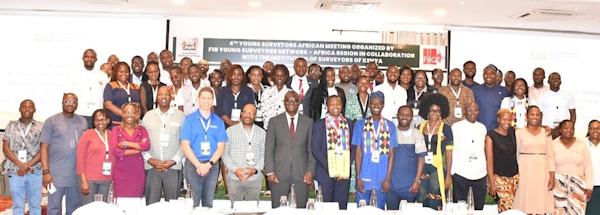
The young surveyors meeting had over 100 participants in attendance.
This meeting brought together a diverse network of students,
early-career professionals, grassroots mappers, researchers, policy
advocates and tech developers from over 10 African countries. The
meeting was categorised under these sub-topics:
- Leadership, innovation and youth empowerment in surveying
and geospatial professionals.
- Surveying and geospatial data integration for
evidence-based policy and sustainable development.
- Partnership and collaboration – public, private, and academic synergies for impact.
- Digital transformation - leveraging emerging technologies
in surveying and geospatial science development.
- Round table discussion on young surveyors’ challenges and
potential solutions.
- Networking, technical tour, and social event.
Day 1 started on a fulfilling note. From the welcoming session to the
keynote address by Prof. Eugene Chigbu, discussing key
challenges we face as professionals. A general lack of awareness of the
diverse surveying professions and their roles in the geospatial
transformation creates missed opportunities for collaboration and
partnerships.
Brain Wesaala, founder and chief executive officer (CEO) of the Football
Foundation for Africa, spoke about football as an infrastructure
for a socio-economic society. He encouaged the participants to become
entrepreneurs in sports and carve a niche as sports surveyors.
The first panel of the day discussed on climate resilience and
environmental sustainability through Surveying and Geospatial solutions.
The panellists involved were Debora Oyugi from
Youth Initiative for Land in Africa (YILAA) who is very passionate
about climate change. She challenged the participants to sit at tables where
decisions and policies are made because most problems require localized
solutions.
AlBright Oburo from African Women in GIS
took the participants through the history of GIS (Geographic Information
System) for the benefit of guests
without GIS knowledge and how technology must be human-centred. This
also resonated on a locally rooted, inclusive and equitable society.
David Elegbede discussed the FIG Volunteer Community
Surveyor Program (VCSP) concept and how it helps the young surveyors
understand grassroot engagement and policy structure from the planning
stage to implementation. He also explained how it shapes the career and
perspectives of the young surveyors involved.
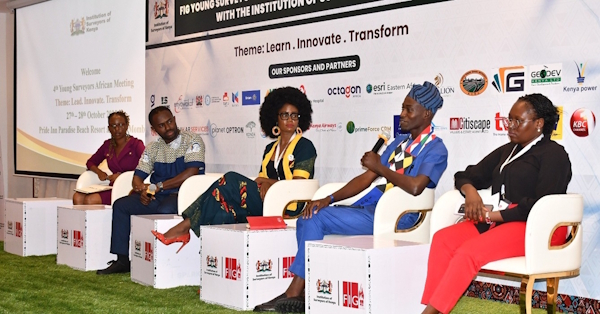
Panel 1: L-R. Fridah Mwangi, Godwill Baah, Deborah
Oyugi, David Elegbede, and Albright Oburo.
Encouraging mentorships for young surveyors
The second Panel was an extensive discussion moderated by
Rebecca Abitimoh (Uganda). Mr. Stephen Djaba
(chair of
FIG Task Force on Evolutionary Diversity and Inclusion)
discussed inclusion as the new coordinates, leaving listeners with an
interesting quote: "Inclusion is not a favour; it is the coordinate
of progress and growth”. Co-panellist Nelly Mbugua
encouraged the young professionals with her journey, also from leading
seniors at the age of 32 to her current position. They collectively
insisted that young surveyors must be willing to take on mentorship and
seek knowledge.
 |
Panel 2: Fridah Mwangi,
Rebecca Abitimoh, Nelly Mbugua, and
Stephen Djaba.
|
Afternoon session of the day started with Dr. Nashon Adero
talking about surveying in a VUCA world Volatility, Uncertainty,
Complexity, Ambiguity) and Africa's opportunity in the built
environment. The meeting further delved into a presentation by
Philmon Ekaale on how an informal Turkana community-led change
initiative and the use of local knowledge continue to shape the future
of land governance and inclusion in collaboration with different
agencies. The last presentation of the day was by Nozipho
Madlala’s video presentation on smart cities rankings and
Africa reimagined.
 The day was fun with a mix of rich discussions and plenty of tea. It
then ended with a social evening and games. Participants engaged in
finding someone who has the same starting alphabet name as them. Then
proceeded to games, were general geographic and African location
questions were asked. Congratulations to the winning team and thanks to
the losing team for agreeing to dance for other winners to watch.
The day was fun with a mix of rich discussions and plenty of tea. It
then ended with a social evening and games. Participants engaged in
finding someone who has the same starting alphabet name as them. Then
proceeded to games, were general geographic and African location
questions were asked. Congratulations to the winning team and thanks to
the losing team for agreeing to dance for other winners to watch.
The second day began with a panel discussion on partnerships and
collaboration, moderated by Nozipho Madlala, featuring
two speakers, Professor Eugene Chigbu and Mr.
Eric Nyadimo. Professor Chigbu presented on tenure-responsive
land use planning as an example of cross-sector collaboration,
illustrating how integrated planning approaches can promote inclusive
and sustainable development. Mr. Nyadimo shared his experiences working
across Africa and internationally, reflecting on how exposure to
different professional environments strengthens collaboration and
innovation in the geospatial field.
 |
Panel session on partnerships and
collaboration by Prof. Eugene Chigbu and Mr. Eric Nyadimo
moderated by Nozipho Madlala.
|
In the following discussion, the
speakers addressed several questions about the challenges of
cross-sector collaboration. These included cultural, language, and
geographic barriers, as well as managing competing stakeholder
expectations and maintaining momentum. They emphasized that
collaborations are relationships that rely on mutual benefit, trust, and
clear communication of expectations.
The next session featured presentations by Nozipho Madlala,
Gustav Fick of Carlson Survey, and Gertrude
Mbaseege (via video presentation). The speakers shared
practical advice with young surveyors on how to build and promote their
personal brands, make effective use of technology, and prepare
professional CVs and cover letters. Participants appreciated the useful
and relatable insights shared, particularly the emphasis on taking
initiative, being intentional about career growth, and using digital
tools to create visibility and credibility in the profession.
Recognition of FIG Foundation grant recipients
The FIG Foundation awards five grants for the 4YSAM. The recipients,
who were recognized for their achievements, were: Oluwaseun Dorcas Adeniji (Nigeria), Daniel
Emmanuel Nyalandu (Tanzania), Twapewa Chikopa
(Zambia), Oyedoyun Abel Timileyin (Nigeria), and
Jecinta Wanjiru (Kenya). Their success stories
reflected the value of mentorship, dedication, and international
collaboration within the Young Surveyors Network. The FIG Foundation has
always supported young surveyors with grants at both global and regional
levels FIG-related meetings or events. We are grateful for this
opportunity and continuous support.

Presentation of the certificate to the FIG
Foundation grant recipients was led by David Elegbede on behalf of FIG
Foundation Board of Directors.
Youth in dialogue
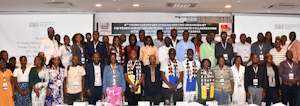 The final session of the second day was a participatory discussion
moderated by David Elegbede. Young surveyors identified key issues
affecting their professional development in their respective regions and
proposed practical solutions. Common themes included the need for more
mentorship opportunities, greater access to technology and training, and
stronger engagement of young professionals in decision-making and
leadership roles. The session concluded with a renewed sense of purpose among
participants, reinforcing the commitment of young African surveyors to
lead, innovate, and transform their communities through collaboration
and professional excellence.
The final session of the second day was a participatory discussion
moderated by David Elegbede. Young surveyors identified key issues
affecting their professional development in their respective regions and
proposed practical solutions. Common themes included the need for more
mentorship opportunities, greater access to technology and training, and
stronger engagement of young professionals in decision-making and
leadership roles. The session concluded with a renewed sense of purpose among
participants, reinforcing the commitment of young African surveyors to
lead, innovate, and transform their communities through collaboration
and professional excellence.
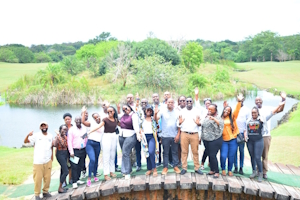 Day 3 were technical tours, organised by Institution of Surveyors of
Kenya (ISK), giving the participants a choice between the Vipingo Ridge
or Harbour tour (Kenya Ports Authority & Kenya Maritime Authority). The
Vipingo Ridge (group photo on the right) is a luxury, sustainable environment built on over
2000 acres of land with diverse habitats which reflects the impact of
planning for a sustainable lifestyle. The Kenya Ports Authority tour
reflects the operations and administrative function of the agency for
socio-economic impact.
Day 3 were technical tours, organised by Institution of Surveyors of
Kenya (ISK), giving the participants a choice between the Vipingo Ridge
or Harbour tour (Kenya Ports Authority & Kenya Maritime Authority). The
Vipingo Ridge (group photo on the right) is a luxury, sustainable environment built on over
2000 acres of land with diverse habitats which reflects the impact of
planning for a sustainable lifestyle. The Kenya Ports Authority tour
reflects the operations and administrative function of the agency for
socio-economic impact.
10th ISK African Regional Conference
The week activity proceeded to 10th ISK African Regional
Conference on 30-31 October 2025, themed “Future-ready landed professionals: Fostering
excellence and
resilience.”
 This conference had a wider ordinance from all facets of the industry
such as top government officials and agencies, academia, private sectors, and
technology providers. The keynote address was on "The future of work in
the built environment: Adapting through lifelong learning and
competency-based education and training (CBET)", delivered by
Professor Washington Yotto Ochieng, head of Department of Civil & Environmental
Engineering at Imperial College of London, United Kingdom, and Dr. Charisse
Griffith-Charles, president of Commonwealth
Association of Surveying and Land Economy (CASLE).
This conference had a wider ordinance from all facets of the industry
such as top government officials and agencies, academia, private sectors, and
technology providers. The keynote address was on "The future of work in
the built environment: Adapting through lifelong learning and
competency-based education and training (CBET)", delivered by
Professor Washington Yotto Ochieng, head of Department of Civil & Environmental
Engineering at Imperial College of London, United Kingdom, and Dr. Charisse
Griffith-Charles, president of Commonwealth
Association of Surveying and Land Economy (CASLE).
The event also had the present of top principal government officials who
were the two guest of honours and the chief guest:
- Engr. John Kipchumba
Tanui, principal secretary of state department for Information
and Communication Technology (ICT) and Digital Economy at Kenya’s
Ministry of Information, Communications and the Digital Economy
(MICDE)
- H.E. Abdulswamad Shariff Nassir, governor, county
government of Mombasa
- H.E. Dr. Hon. Musalia Mudavadi, Elder of
the Order of the Golden Heart of Kenya (EGH), prime cabinet secretary
as well as cabinet secretary for foreign and diaspora affairs at the
Ministry of Foreign and Diaspora Affairs, respectively
There were other presentations and discussions on the following:
- The future of AI in real estate with smart infrastructure
perspectives.
- Data protection and collaboration for business sustainability.
- Real estate futures: Navigating disruption, technology and climate
risk in the built environment.
- Marina and natural resources: Surveying for the blue and green
economy.
- Organisational dynamics, inclusion & ethical practices and
geospatial
intelligence for blue-green future.
- Modernization and integration of geodetic reference frameworks in
transition/geospatial intelligence and digital mapping for development.
- Innovative technologies and investment pathways for the built
environment.
- Inclusive design, gender equity, and social impact.
- Ethics, governance, and professional integrity in the built
environment.
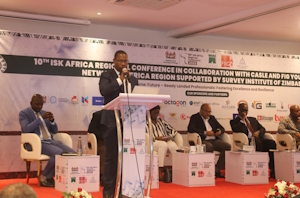 The conference reflects the strengths of collaboration in providing
avenues for students, young and seasoned professionals to address
complex challenges and opportunities in the phase of career or
professional development. It further aims to provide opportunities for:
The conference reflects the strengths of collaboration in providing
avenues for students, young and seasoned professionals to address
complex challenges and opportunities in the phase of career or
professional development. It further aims to provide opportunities for:
- Innovation solutions to land degradation, tenure insecurity and
informal settlements. Embracing advancements in Geospatial technology,
AI-driven spatial data analysis and smart valuation tools.
- Leading the voice that advocates for policies on inclusive,
climate-smart and ethically sound development.
- Focus on contributing to Sustainable Development Goals (SDG) 11, 13, 14, and 15.
Looking into the future, the conference envisioned
the future projection in reimagining the role of land professionals in shaping urban
development and the future of the environment. Contributing and
recommending actionable national policy and legal frameworks, strengthen
collaboration and partnerships amongst professional networks across
sectors and borders.
Report by David Elegbede
Contributions from Nozipho Madlala and Fridah Mwangi
Published 27 November 2025























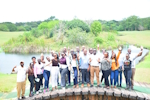





 The day was fun with a mix of rich discussions and plenty of tea. It
then ended with a social evening and games. Participants engaged in
finding someone who has the same starting alphabet name as them. Then
proceeded to games, were general geographic and African location
questions were asked. Congratulations to the winning team and thanks to
the losing team for agreeing to dance for other winners to watch.
The day was fun with a mix of rich discussions and plenty of tea. It
then ended with a social evening and games. Participants engaged in
finding someone who has the same starting alphabet name as them. Then
proceeded to games, were general geographic and African location
questions were asked. Congratulations to the winning team and thanks to
the losing team for agreeing to dance for other winners to watch. 

 The final session of the second day was a participatory discussion
moderated by David Elegbede. Young surveyors identified key issues
affecting their professional development in their respective regions and
proposed practical solutions. Common themes included the need for more
mentorship opportunities, greater access to technology and training, and
stronger engagement of young professionals in decision-making and
leadership roles. The session concluded with a renewed sense of purpose among
participants, reinforcing the commitment of young African surveyors to
lead, innovate, and transform their communities through collaboration
and professional excellence.
The final session of the second day was a participatory discussion
moderated by David Elegbede. Young surveyors identified key issues
affecting their professional development in their respective regions and
proposed practical solutions. Common themes included the need for more
mentorship opportunities, greater access to technology and training, and
stronger engagement of young professionals in decision-making and
leadership roles. The session concluded with a renewed sense of purpose among
participants, reinforcing the commitment of young African surveyors to
lead, innovate, and transform their communities through collaboration
and professional excellence. Day 3 were technical tours, organised by Institution of Surveyors of
Kenya (ISK), giving the participants a choice between the Vipingo Ridge
or Harbour tour (Kenya Ports Authority & Kenya Maritime Authority). The
Day 3 were technical tours, organised by Institution of Surveyors of
Kenya (ISK), giving the participants a choice between the Vipingo Ridge
or Harbour tour (Kenya Ports Authority & Kenya Maritime Authority). The
 This conference had a wider ordinance from all facets of the industry
such as top government officials and agencies, academia, private sectors, and
technology providers. The keynote address was on "The future of work in
the built environment: Adapting through lifelong learning and
competency-based education and training (CBET)", delivered by
Professor Washington Yotto Ochieng, head of Department of Civil & Environmental
Engineering at Imperial College of London, United Kingdom, and Dr. Charisse
Griffith-Charles, president of Commonwealth
Association of Surveying and Land Economy (CASLE).
This conference had a wider ordinance from all facets of the industry
such as top government officials and agencies, academia, private sectors, and
technology providers. The keynote address was on "The future of work in
the built environment: Adapting through lifelong learning and
competency-based education and training (CBET)", delivered by
Professor Washington Yotto Ochieng, head of Department of Civil & Environmental
Engineering at Imperial College of London, United Kingdom, and Dr. Charisse
Griffith-Charles, president of Commonwealth
Association of Surveying and Land Economy (CASLE). The conference reflects the strengths of collaboration in providing
avenues for students, young and seasoned professionals to address
complex challenges and opportunities in the phase of career or
professional development. It further aims to provide opportunities for:
The conference reflects the strengths of collaboration in providing
avenues for students, young and seasoned professionals to address
complex challenges and opportunities in the phase of career or
professional development. It further aims to provide opportunities for: